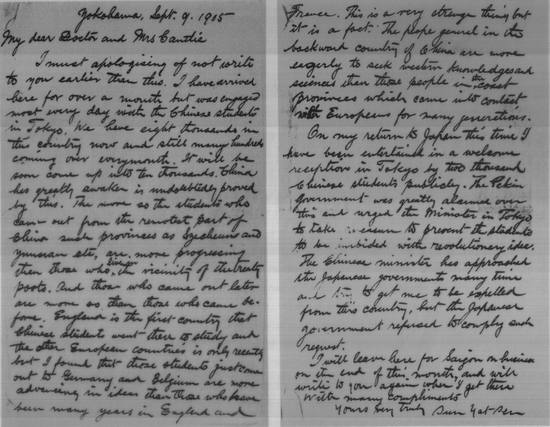|
For me the last week the theme has been "communication." This hasn't been so much about my personal communication as about how it may be changing. Or not. When it comes to social media the popular outcry is, "It's killing social skills - Everyone is on their text!" and "It will do away with real letter writing - it will kill how we write at all!" Yet, this week I have seen more business articles on the need for businesses to actually communicate with their customers. To actually interact, and be social. And I have been avidly reading these articles in hopes of learning a means to get that idea across to clients. And, of course, being a history buff, my mind also began making comparisons to older forms of communication. The first, and most popular, comparison, and statement, is that there is always a outcry that new technology will kill the older. And while communication methods change - they never really kills the original. So I decided to do a two part blog on letter writing and social media; part history and part business. The first part will concern itself with a communications overview. And Part 2 will be concerned with the power and spread of opinion. I'd say that letter writing really hit its heyday as families and friends became separated by marriage and necessity, particularly as people immigrated off to more distant lands. The price of posting and of writing materials always was a factor, and so information was often crammed into as much white space as was possible. Even when telephones came along - the price of a call, particularly long distance calls, impacted how much time and information could be shared. And so back to the letter. When email came along it allowed for communicating across far greater distances, for next to nothing, and in a shorter time. Much more could actually be shared, and letter writing flourished again. Now we are seeing the same with the social media, though not at the length. People now don't have to save up a bulk of information, and then condense it all into cliffnote versions in their lives. It can be communicated as they think of it, and responded to just as quickly. Now back to business.... I know from having a father who was a salesman that business people are very social individuals. Often times business associates become lifelong friends, and conversations can go on for hours - if schedules allow. However, they are also trained in a business mind set. That says, "You have to get your sales point across quickly and efficiently." Mailings and advertisements are aimed at this. Even networking groups don't really allow social interaction; the members come in, present their product/service, and only if they have a minute at the end of the event can they grab a second to socialize. So when business personnel are dealing with social media they are still in the same "get to the point, and advertise" mindset. Getting your product and service out there is definitely the "why" of being on the internet, but the way of communicating needs to go back to the concept of knowing your customers. To do this, you have to think "conversation." This allows customers, particularly new customers, get a feel for who you are, and how you interact. You become a little bit more "real" to them, and they will feel more comfortable doing business with you.
0 Comments
It wasn't till recently that I had really pondered how old username and email habits might affect an individual's views of social media. Maybe it was because I came to the internet at the time when email interaction was the newest "social" craze, and so I hadn't stepped far enough back in order to consider the question.
Anymore, though, I have to consider the "whys" of potential clients' reluctance regarding social media usage, and am always looking at what might impact their outlook. It is a topic I often discuss with a friend of mine, and he mentioned that many over the age of 50 are suspicious of social media and how much it might intrude on their privacy. This I could accept as a relative given, and what I ran into recently supports this, but with a twist. Not too long ago a old friend tried to connect with me on Linkedin, but for her profile she was using a old fantasy character name. One I have heard her mention off and on from her various online games, since she often plays, and reviews, them. When I asked her about it she said that she had only created an account because someone recommended Linkedin, but that she wasn't about to tell anything about herself! Yes, she fits the demographics on age, with the attendant suspicions about privacy, but I realized she also fits into another demographic. The demographic I am considering is made up of people who still strive to have the anonymity of their username/email. I can remember the time, particularly in regards to participating in any online group, that the email names often defined the "who" you were emailing, or talking to on AIM. The anonymity of the users names were an accepted part of the masquerade. In many ways the email groups were the realm of make believe, but this was also the cause of concern, because the unwary could be led astray. Now transparency is becoming the byword. Social media, like the earlier use of email, originally was a playground; a new “toy” where people could express themselves – usually behind a “mask.” Yet, like email, businesses have begun to rely on social media, and reality, rules, and etiquette are setting in. And once again a person's reputation is vital. And open for scrutiny. Yes, a frightening thought for many, but the playground has given way to "reality" for any who desire to be in the professional world. Keeping the story consistent is vital for any business pursuing social media as a marketing tool.
In many ways, strange as this sounds, it is often easier for the larger businesses. There they can meticulously study how to tell their brand's story; decide who will implement it; and monitor the responses. This even holds true when several departments are involved. There are guidelines and common structure. So what do they have that smaller companies don't? People. Smaller companies need social media, and a consistent message, as much as the bigger companies. Yet, when they are working on social media themselves it is often a case of "just put something out there." And where this comes from is, "We have to deal with business, and as long as we keep our media active we are good." Yes, activity is a necessity, but here is where the real challenge comes in - "What is going to make the effort worthwhile?" Even if you have managed to have a variety of material - text, links, photos, and videos - the question needs to be, "Are they relevant to your story? Or is it too random?" These are the best questions to ask. And are the best criteria to give yourself, your employee, or your hired specialist. Last Friday I stood wiping away tears as I washed off my old rocking horse for the auctioneer. Up until that moment it had sat in the basement, unacknowledged, and covered in forty years of dust, but with the contact, and the care, memories whispered back. This was the present my Uncle Dewey gave me. He had walked me across the street to the Thirfty's, and let me pick out any toy I wanted. Even if it was a black plastic rocking horse nearly too big for me. But Uncle Dewey lived large, even for a family that lived large, and in a heartbeat he had purchased it, and carried it back across the street for me. On my daring steed I dreamed many adventures, as an only child will, and that Friday morning, as I gently washed its molded black mane, I sorrowed for forgetting my brave companion. Harder the still was the idea that I was planning on including it in a auctioneer's lot. But what does a fifty-five year old woman need with a rocking horse? When the auctioneer began to haul stuff from the basement, and reached for the rocking horse all I could say was, "Stop." Such memories are not given away lightly. Particularly not to someone who shrugs off other people's loves and memories with a jaded shoulder. Originally I thought this tale more fitting for my White Fox Stories page, but I realized that it had more to do with social media. I have heard friends say, "Our history will be lost! Everything will be digital and in two hundred years will be gone!" But then I think of the theory that all of our radio signals and T. V. shows are eternally broadcasting across the universe, and I have to wonder - What of all the media consigned to the internet? Shared, liked, and commented on - working further and further away from its source. Does this give some immortality to our memories? Granted I have no answers, and am admittedly waxing a bit maudlin, but any who reached middle age (and many before) are faced with the remnants of family lives. And the question soon becomes, "How many memories can I save?" "How many talismans of my life can I store?" As I worked through my house I also found my bronze baby shoes. "Ah, who would want the footwear of another''s baby?" And yes, I am endeavoring to save the above memories - to send them off into a digital land of the young. Because all of this reminded me of all of those photos that are saved onto the internet - lifetimes of vacation, celebrations, births, and memorials. Personal stories of both human and pet, and the wild too.
Oh the technology and the media will change, and who knows if all of these memories will be able to be accessed in two hundred years. But I find some reassurance in the possibility that like our old radio signals the digital transmissions of our memories will live on. |
Cathy Mosley
Cathy Mosley brings her 26 years of storytelling and writing experience to the realm of Social Media. To help small businesses. Archives
July 2021
Categories
All
|



 RSS Feed
RSS Feed

